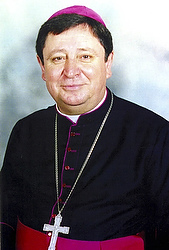 In paragraph 24 of Vatican II’s Decree on the Adaptation and Renewal of Religious Life (Perfectae Caritatis, 1965), we find this summary of what we might call “vocation ministry”:
In paragraph 24 of Vatican II’s Decree on the Adaptation and Renewal of Religious Life (Perfectae Caritatis, 1965), we find this summary of what we might call “vocation ministry”:
“Priests and Christian educators should make serious efforts to foster religious vocations, thereby increasing the strength of the Church, corresponding to its needs. These candidates should be suitably and carefully chosen. In ordinary preaching, the life of the evangelical counsels and the religious state should be treated more frequently. Parents, too, should nurture and protect religious vocations in their children by instilling Christian virtue in their hearts.
“Religious communities have the right to make themselves known in order to foster vocations and seek candidates. In doing this, however, they should observe the norms laid down by the Holy See and the local Ordinary.
“Religious should remember there is no better way than their own example to commend their institutes and gain candidates for the religious life.”
Three things jumped off the page to me when I recently reread this document:
(1) Vatican II encourages more preaching on the evangelical counsels and the religious state, yet how often do we hear anything from the pulpit on the splendor of consecrated life?
(2) Parents not only nurture but protect their children’s vocations by instilling Christian virtue. One wonders how many religious vocations have been lost by parents’ failure to foster Christian virtue in the home through their own words and actions, and through the appropriate exercise of discipline.
(3) Religious have the right to promote their community, but in the end the most effective means of attracting young men and women is through their own personal witness of lives completely and joyfully given to the Lord.

 Sometimes it’s really difficult to decide upon just the right anniversary gift. However, I think our readers will agree that the following recommendation from the United States Conference of Catholic Bishops for the upcoming 60th anniversary of Pope Benedict’s priestly ordination–Eucharistic adoration for priestly vocations–is right on the money.
Sometimes it’s really difficult to decide upon just the right anniversary gift. However, I think our readers will agree that the following recommendation from the United States Conference of Catholic Bishops for the upcoming 60th anniversary of Pope Benedict’s priestly ordination–Eucharistic adoration for priestly vocations–is right on the money.  The
The 
 A
A  Our readers are encouraged to visit the the
Our readers are encouraged to visit the the  Last Friday, the Jamaica Plan (NY) Gazette published an
Last Friday, the Jamaica Plan (NY) Gazette published an  While this vocation blog focuses primarily on vocations to the priesthood and religious life, I thought today I would introduce our readers to the work of Anthony Buono, who for many years has been a leader in assisting those who believe that God is calling them to the vocation of Christian marriage.
While this vocation blog focuses primarily on vocations to the priesthood and religious life, I thought today I would introduce our readers to the work of Anthony Buono, who for many years has been a leader in assisting those who believe that God is calling them to the vocation of Christian marriage. When my daughter Virginia was about a year old, I twice received calls that she was unconscious and being rushed to the hospital. (I hope you fathers out there never receive such a call.) Thanks be to God, on both occasions, by the time I arrived at the emergency room, she was awake and fine.
When my daughter Virginia was about a year old, I twice received calls that she was unconscious and being rushed to the hospital. (I hope you fathers out there never receive such a call.) Thanks be to God, on both occasions, by the time I arrived at the emergency room, she was awake and fine.